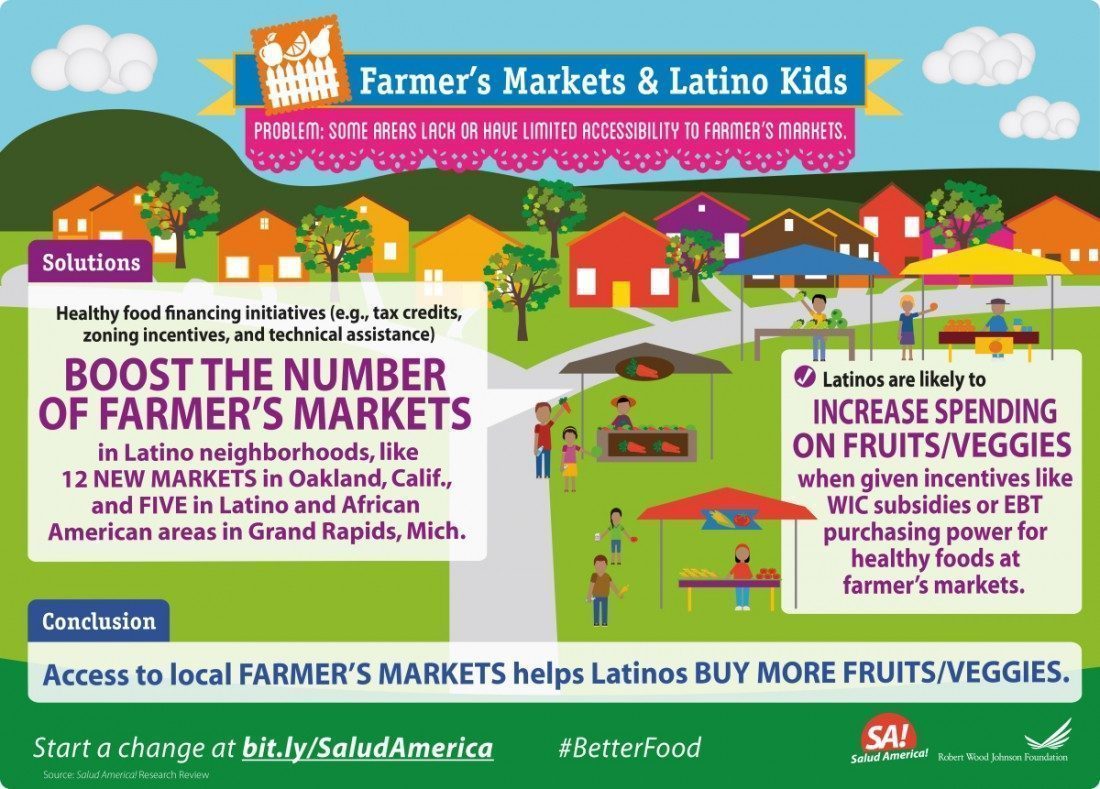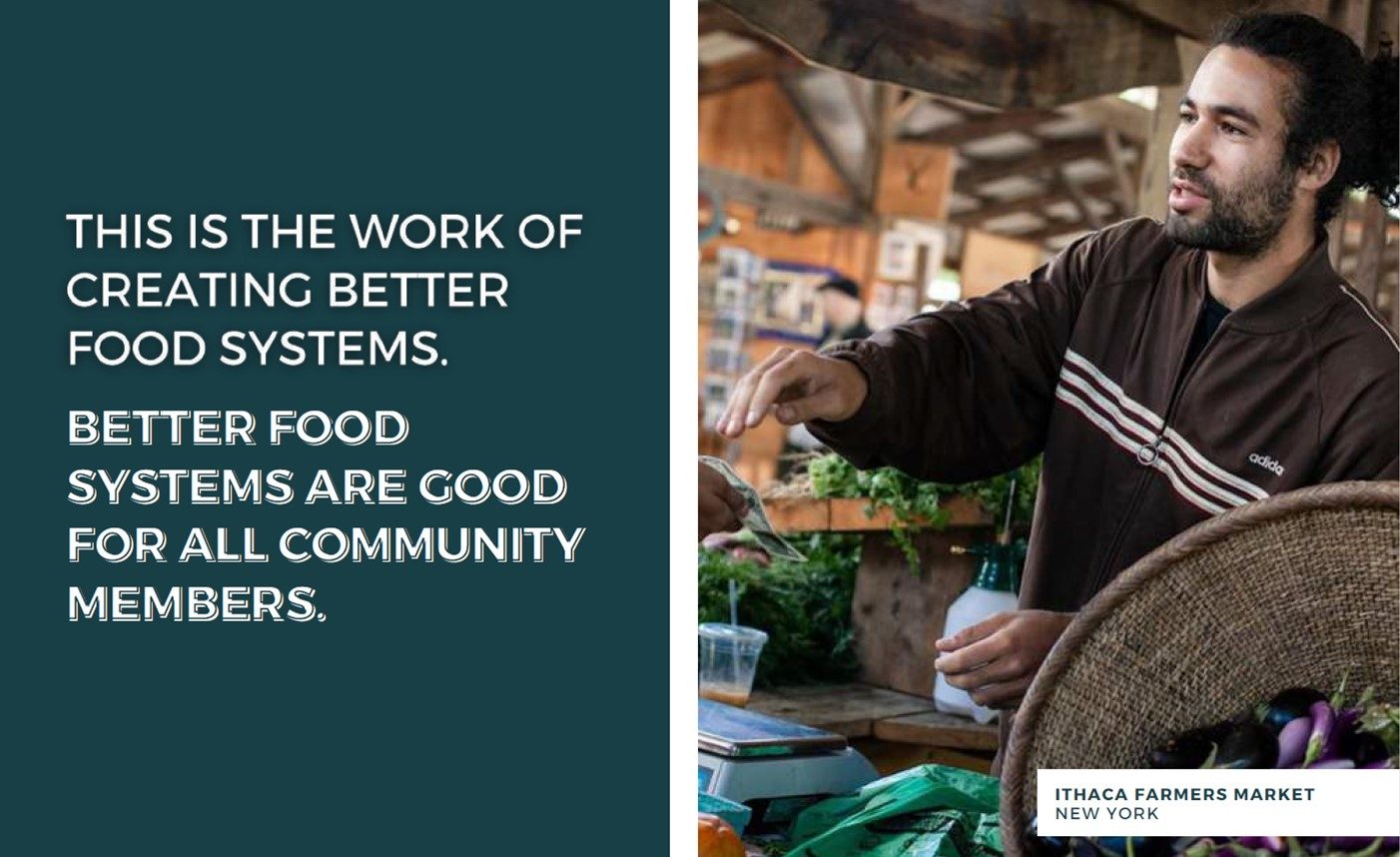
How Farmers Markets Can Promote Racial Justice
Does your town have a farmers market?
Farmers markets are a path to healthy food access. They are especially important amid the push for nutrition security and racial/ethnic justice.
Fortunately, the Farmers Market Coalition is stepping up to support farmers markets.
They’re supporting markers, creating an anti-racist toolkit, and sharing how markets increase equitable access to healthy, fresh produce and social connections, and engage farmers in the local economy.
“As hubs for connection and community resilience, farmers markets have particularly risen to the occasion this year by providing a necessary sense of unity and stability during a time of great uncertainty,” according to the coalition. “Farmers markets don’t just happen. The hard work of farmers market operators should be recognized.”
For National Farmers Market Week on Aug. 7-13, 2022, we at Salud America! at UT Health San Antonio are showcasing the value of farmers markets for Latinos and all people!
How Do Farmers Markets Impact Healthy Food Access for Latinos?
Latinos frequently live in food swamps.
In these areas, Latinos have no easy access to supermarkets and farmers markets. But they have more access to fast food and corner stores. This leads to overconsuming unhealthy foods, according to a Salud America! research review.
 The number of U.S. farmers markets has more than doubled in the past 20 years. It rose from 2,863 in 2000 to 8,768 in 2019, according to a USDA database.
The number of U.S. farmers markets has more than doubled in the past 20 years. It rose from 2,863 in 2000 to 8,768 in 2019, according to a USDA database.
As of June 2022, the database reflected 1,015 farmers markets, 1,662 on-farm markets, and 229 food hubs.
Many of these markets are not accessible to Latinos.
In fact, a San Diego State University report indicates that 44% of the city’s farmers markets are in census tracts with high levels of gentrification.
This misses a big opportunity to improve Latino health.
Latinos are willing to support farmers’ markets introduced into their neighborhoods. For example, the presence of a farmer’s market was linked to greater consumption of fruits and vegetables among immigrant women in New York City.
“Farmers markets foster direct relationships between community members and farmers … to create a more fair and sustainable food system,” according to the coalition. “Farmers markets are a hub for connection and collective action around shared values.”
How Are Farmers Markets Responding to Social Justice Issues?
The Farmers Market Coalition had launched the Anti-Racist Farmers Market Toolkit. A group of Black food systems leaders and market managers developed toolkit content.
The toolkit helps managers to put anti-racism concepts into practice within farmers markets. The aim is to improve market experiences for Black, Latino, and other people of color.
 It is framed around four actions:
It is framed around four actions:
Management. Anti-racist market managers should prepare to address problem behaviors, design inclusive processes, and maintain equity-oriented policies.
Mission. Historically and currently underserved people need to see their communities reflected in the market’s vendors, which may require new training.
Messaging. Developing culturally relevant messaging about the market and its programs is a must.
Measurement. Making change requires first establishing a baseline understanding of how the market functions, establishing its current climate and culture.
A recent example is the San Luis Obispo Farmers Market in California.
The market hosted a block party on “belonging,” sponsored by Race Matters SLO, to highlight local Black-owned businesses, are, and health actions.
“Vaccines were being given out and some people were able to get their shots,” according to KSBY. “There was also live music from multiple local DJs and an arts and crafts table for people to get creative.”
How Can We Make Farmers Markets Better?
Farmers markets that enable greater purchasing power for fruits and vegetables also can increase spending on fresh produce.
 In 2021, low-income families redeemed over $100 million in SNAP and federal nutrition benefits at farmers markets or farms. 572,769 snap households made at least one purchase at a farmers market or directly from a farmer, according to the coalition.
In 2021, low-income families redeemed over $100 million in SNAP and federal nutrition benefits at farmers markets or farms. 572,769 snap households made at least one purchase at a farmers market or directly from a farmer, according to the coalition.
Also, 60% of farmers market customers in low-income neighborhoods say their farmers market had better prices than their grocery store.
Kaely Summers is squeezing even more benefits from farmers markets.
Summers is the manager of Adelante Mujeres’ Forest Grove Farmers Market in Oregon. But Summers saw that kids get a little bored when they came to the market with their parents.
So Summers and other market leaders teamed up to create the bilingual Market Sprouts Kid Club. The club uses fun activities to teach Latino kids and all kids about farming, fresh produce and healthy eating at the market.
“For [kids] to get engaged in eating healthier, we wanted to make sure that everything we were doing is fun,” Summers said.
How Can You Take Action?
Check this awesome database to see if there’s a farmers market near you.
Yes? Visit and share your experience on social media with #FarmersMarketWeek #LoveMyMarket.
No? Think about starting one in your own neighborhood.
You can be like San Antonio teacher Michelle Griego.

“A big part of the farmers’ market is educating people who come out to our market,” Griego said, which is why securing demonstrations is important. “It’s been a journey, but it’s not over!”
We also urge you to get involved for the health of your community!
No matter what topic you are interested in, be sure to download the Salud America! The Health Equity Report Card. The Report Card auto-generates local data with interactive maps and gauges. These can help you visualize inequities in local healthy food access compared to your state and nation.
You can email your Health Equity Report Card, share it on social media, and use it to make the case for community change to boost health equity. This is where everyone has a fair, just opportunity to live their healthiest.
Get your health equity Report Card!
Editor Note: The main art image is from Jenna Shea Photojournalism via the Farmers Market Coalition’s Anti-Racist Toolkit.
The post How Farmers Markets Can Promote Racial Justice appeared first on Salud America.

